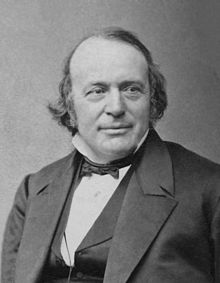Swiss-American naturalist (1807–1873) From Wikipedia, the free encyclopedia
Jean Louis Rodolphe Agassiz (May 28, 1807 – December 14, 1873) was a Swiss-born and European-trained biologist and geologist. His work on natural history in Europe and the Americas was important.[1]
Louis Agassiz | |
|---|---|
 | |
| Born | May 28, 1807 Haut-Vully, Switzerland |
| Died | December 14, 1873 (aged 66) Cambridge, Massachusetts, U.S. |
| Alma mater | University of Erlangen-Nuremberg |
| Awards | Wollaston Medal (1836) |
| Scientific career | |
| Fields | |
| Author abbrev. (zoology) | Agassiz, Ag., L.Ag., Agass. |
| Signature | |
 | |
His reputation now is less good, because he fought against the theory of evolution, and held wrong ideas about human races. He thought the different human races were of different origins. This idea is called "polygenism".[2][3] Darwin's comment at the end is interesting:
After visiting Harvard University in mid-career, he emigrated to the U.S. in 1847 and became a professor of zoology and geology at Harvard. He founded its Museum of Comparative Zoology.
Agassiz made extensive contributions to ichthyology (including extinct species). He founded glaciology, the study of ice fields and ice ages.
Seamless Wikipedia browsing. On steroids.
Every time you click a link to Wikipedia, Wiktionary or Wikiquote in your browser's search results, it will show the modern Wikiwand interface.
Wikiwand extension is a five stars, simple, with minimum permission required to keep your browsing private, safe and transparent.